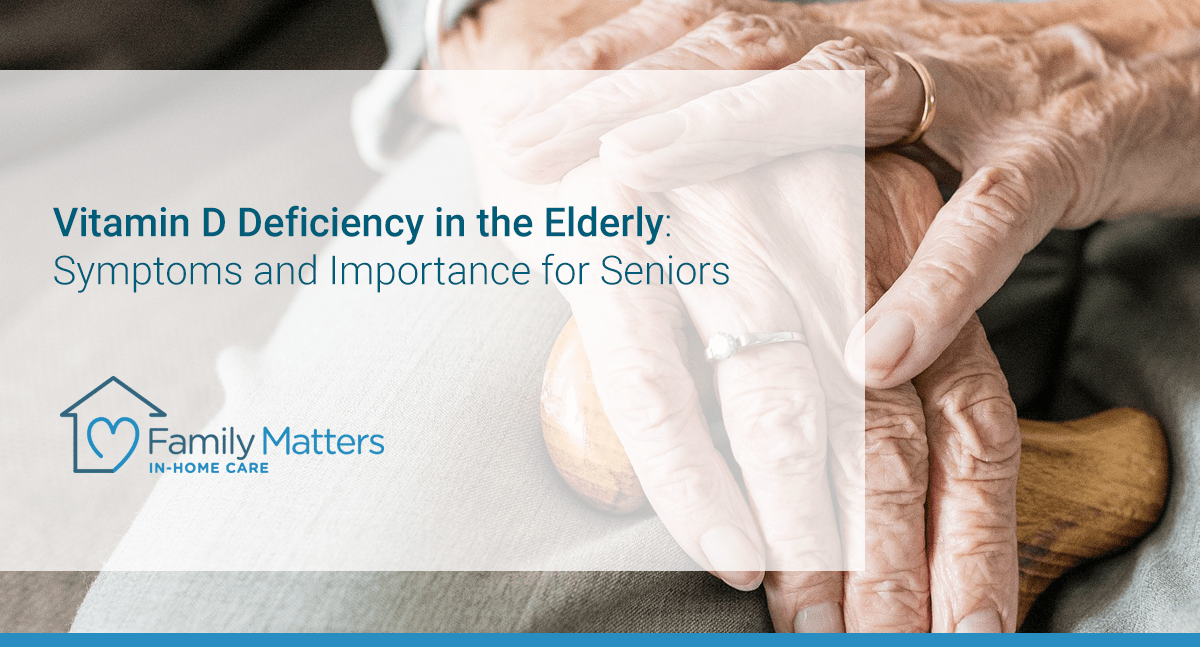
Vitamin D Deficiency in the Elderly: Symptoms and Importance for Seniors
It’s not entirely abnormal to be deficient in certain nutrients, some of which are difficult to get from food alone. This is the case with vitamin D, which we primarily get through exposure to sunlight.
When the sun hits your skin, the UVB radiation activates a type of cholesterol that becomes vitamin D. However, many people, especially those who live in areas with fewer daylight hours, simply don’t get enough vitamin D naturally.
Even worse, the body’s ability to create vitamin D through this mechanism wanes as we age, meaning the elderly are particularly susceptible to vitamin D deficiency.
This is in addition to the fact that loss of mobility as we age, along with restrictions associated with residential care, prevents many seniors from getting outdoors in the first place.
Why is this important? What does vitamin D do? Here’s what you need to know about the importance of vitamin D for seniors, and the symptoms of deficiency.
Benefits of Vitamin D for Seniors
While not as well-known as vitamin C, iron, or other essential nutrients, vitamin D plays a critical role in promoting health and wellness. The primary function of vitamin D is that it aids in the absorption of calcium, helping to keep bones strong and prevent deterioration. For seniors, vitamin D could help to prevent osteoporosis, protect teeth, and even play a role in staving off muscle weakness.
It does so much more, though. Vitamin D is also involved in regulating circulatory, digestive, immune, inflammatory, and nervous functions. Deficiency has been linked to such varied problems as cancer (particularly colon cancer), diabetes, heart disease, and even depression. Studies have shown a connection between vitamin D and the body’s ability to fight viruses, as well.
Why is Vitamin D Deficiency in Seniors a Problem?
As we age, we face a number of dramatic changes, not only physically, but mentally, emotionally, and socially. Our bodies and minds can begin to decline in a number of ways, and this can be amplified by issues like loss of family and friends, leading to isolation.
Loss of mobility and depression can have a major impact on the health and wellness of seniors, and lack of needed nutrients can further exacerbate decline. Vitamin D deficiency in seniors is particularly notable. This condition has been linked not only to musculoskeletal conditions like osteoporosis and muscle weakness, but also depression and cognitive decline.
Vitamin D deficiency in elderly symptoms also include increased risks of serious diseases like cancer, diabetes, and heart disease, including hypertension. Deficiency can impact the function of neurotransmitters in the brain responsible for regulating mood, and it could play a role in depression and seasonal affective disorder (SAD), among other mental health concerns.
Fatigue, weight gain, and conditions like IBD could all be linked to vitamin D deficiency, as could susceptibility to viruses like the flu. Considering that the risks for vitamin D deficiency increase with age, it becomes even more important to ensure that seniors are getting adequate vitamin D.
How Seniors Can Improve Vitamin D Intake
The best way to get needed vitamin D is through exposure to sunlight, which is why it is often referred to as “the sunshine vitamin”. It’s no coincidence that people in regions with limited daylight hours are more likely to develop SAD, depression, and other disorders associated with vitamin D deficiency.
That said, it’s best to limit exposure to about 30 minutes per day, as more exposure to UVA/UVB rays can prove harmful. Vitamin D derived from sunlight could circulate in the body up to twice as long as ingested sources.
However, if daily sun exposure isn’t possible, or isn’t enough to boost vitamin D levels sufficiently, seniors can also increase intake through diet. Foods like mushrooms, egg yolks, and fatty fish and seafood (tuna, sardines, oysters, shrimp, and more) are excellent sources of vitamin D. Some foods, like dairy products, orange juice, and breakfast cereal, may also be fortified with vitamin D.
While there are several ways to increase vitamin D intake, the problem for many seniors is that the processes by which we absorb vitamin D become less efficient with age. For this reason, it may become necessary to take a daily vitamin D supplement. The recommended daily allowance of 400 IU for adults may not be enough, though. In this case, it’s best to speak with a doctor about increasing dosage. Vitamin D deficiency can be a problem at any age, but it becomes more pronounced as we age and other factors contribute to physical and mental decline. Seniors that maintain adequate levels of vitamin D are more likely to enjoy better health, wellness, mobility, and other benefits.
If you or your family member is considering in-home care as part of a plan to age in place, contact Family Matters In-Home Care today for a free consultation. Our team is dedicated to supporting your family and helping older adults enjoy life in the comfort of their own home for as long as possible.
Some of the services offered by Family Matter In-Home Care include: Alzheimer’s & Dementia Care, Bed & Wheelchair Transfer Assistance, Companionship, Housekeeping & Meal Preparation, Personal Care, Recovery Care, and Transportation.
Serving the San Francisco Bay Area and Greater San Diego, Family Matter In-Home Care has offices throughout California including: Campbell, CA, Roseville, CA, San Marcos, CA, and San Mateo, CA.
